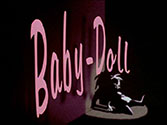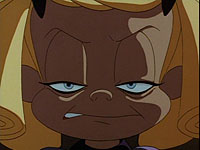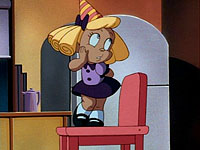|
||
|
| Credits | Cast | |
Written by Paul Dini Directed by Dan Riba Music by Shirley Walker Animation by Studio Junio |
Kevin Conroy as Bruce Wayne Loren Lester as Dick Grayson Efrem Zimbalist, Jr. as Alfred Bob Hastings as Commissioner Gordon Robert Constanzo as Bullock Mari Devon as Summer Gleeson |
Alison Laplaca as Mary Dahl Jason Marsden as Spunky Spencer Robby Rist as Brian Daily Judy Strangis as Tammy Vance Tasia Valenza as Miriam Alan Young as Ted Baker |
|
“Mudslide” is similarly rich in allusion, and were “Baby-Doll” as successful then maybe it would be worth an egregiously academic essay. And “Baby-Doll” also has the classic BTAS fixation on psychological dysfunction: the central character is a villain who prefers self-deception and tries to warp the world into her preferred illusion. But the elements don’t hang together. Where the characters and circumstances of “Heart of Ice” and “Mad as a Hatter” and “House and Garden” work themselves out in seemingly inexorable tragedy, “Baby-Doll” is all gears and pulleys and machines that go “ping.” Rarely in BTAS has the thought and mechanics that go into its deeper stories been so cruelly exposed. Paul Dini says he wrote “Heart of Ice” backwards: He started with an image of Victor Frieze’s tears turning to snowflakes, then built a story that would lead the viewer to that inevitable denouement. “Baby-Doll” ends with a similar image of crushed personality: Mary Dahl confronts her normal alter ego in a funhouse mirror and riddles it with bullets. And it starts with the creepy sound and image of a gravel-voiced little girl luring her victim into a trap. It shouldn’t be too hard to get from here to there. But the journey is purely schematic. Like Hagen, Dahl is an actor at war with her craft. Unlike Hagen, however, she is imprisoned within her persona. Like Harvey Dent, Dahl evinces two personalities. Unlike Dent, that doesn't keep her from shifting abruptly between her two personas, between an adult mood and her grating “Baby Doll” act. The intended construct is plain to see: Dahl is a two-sided character who is unable to let go of either side, even though these two halves destabilize each other, with Baby Doll becoming menacing and Mary Dahl becoming pathetic. This is a daring line, but the effect is not well realized. For which is the real character we are meant to understand and feel a biting sympathy for? Frieze, Tetch, Isley, Dent, Hagen, and others bind menace and pathos into a unified whole. But Dahl/Doll is so deeply split that the audience can never come to grips with her emotionally—only the intellectual design of her character concept stands out.
"Baby-Doll" fascinates on a first viewing because it is such a mess that it is never predictable. Only at the end, when it reaches for a meant-to-be-moving finale, do you realize where it was going and how it meant to get there. Consequently, the pathos at the end doesn't feel earned. Ultiimately, "Baby-Doll" has only a kind of sitcom cleverness: stagey bits that look and sound good in isolation but which don't come together to make a coherent whole. That is, I suppose, the right form for the story of sharp little schizo like Dahl. But it also illustrates how an unstable character like Dahl can destabilize her own drama. "Two Face" works because it's the story of a single (two-faced) coin. But "Baby-Doll" is just a crumbly little cookie. |
|
|
|
Related Episodes |
What Others Are Saying ... |
| Back to Avatar |
Forward to Bane |



 Then there’s Baby-Doll’s design. With that design, the episode achieves some of the
Then there’s Baby-Doll’s design. With that design, the episode achieves some of the